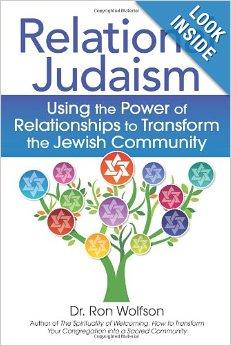
Book Review by Rabbi Goldie Milgram
Relational Judaism: Using the Power of Relationships to Transform the Jewish Community by Ron Wolfson primarily reasserts a core principle of life, business and community organizing: "It's all about relationships." This was also essentially the theme of his 2006 volume, The Spirituality of Welcoming: How to Transform Your Congregation into a Sacred Community. His patience and willingness to restate his message is impressive, given how slow the uptake among congregations world-wide seems to be, at least in this reviewer's experience.
The direction of relationship-building is changing, as Wolfson indicates in a telling quote from a congregational leader:
"We thought Shabbat would be a doorway to relationships. We learned that relationships are a doorway to Shabbat." Or as in the famous quote from Martin Buber further on: "All real living is meeting." Another powerful reversal of perspective quote included comes from Rabbi Zoe Klein, upon becoming senior rabbi at Temple Isaiah, Los Angeles:
She was advised by the board to 'tell her story to the congregation'. She felt differently:
'The way people feel really connected to you is not if they know your story, but if they feel you know their story. If the rabbi knows your story you feel like you are seen, you matter, you are in relationship. So I set up small groups in my study--six to eight people--to share a 'Sacred Stories Haggadah" experience; we had a little Kiddush, karpas, appetizer; we told the story of the congregation, and then I would invite people to add their own stories by answering the question: "What was your own journey that brought you to this place?" We concluded with a blessing. Some 250 people shared their stories with me and with
each other. It was powerful.' ............................................................................................
Wolfson's examples are solid and instructive applications of what those who have participated in support groups of every kind are well aware--the sharing of personal narratives, stories from our lives joys, traumas, challenges, innovations and more-often supports the creation of sustainable communities. He also offers encouragement to adopt the kind of volunteerism that engages participants in meaningful ways. Indeed, as happens with books, that direction is already visible in the field of Jewish education and communal service. As this reviewer is involved in doing that very thing, she is aware that this area is being developed and in the emerging field of Jewish Spiritual Education, as well. He further takes note of the ascendancy of Jewish interest in social justice efforts and the relational opportunities and challenges of social media.
For anyone who is already trained in social work, group work, chaplaincy, or providing psychotherapy of most any kind, it is initially bemusing to read of a leader in the field of Jewish education writing something that has been known and skillfully practiced in social service organizations since at least the days of the settlement houses:
Working with others on a project can bind people together, but only if attention is paid to relationship building. We learned this lesson in Synagogue 2000 when we insisted that the leadership team begin every session with "check-in," a brief opportunity for every person in the room to share something about her or his personal life. I am reminded of the power of the quilting bee, when groups of women would join together to craft beautiful quilts, but through sharing the stories of their lives as they worked, they crafted deeper relationships among themselves...................................................
How is it possible that most clergy and educators don't have the core skill repertoire of social work and seem to be trying to reinvent it from scratch? This reviewer is a rabbi and an MSW. From this vantage point, the problem would seem to be that of an unfortunate split, almost a conceptual wall, between the domain of training for Jewish social service and that for synagogues, religious education, and religious-movement youth groups. Ron Wolfson is a PhD academic and highly accomplished Jewish educator. His on-line bio don't show evidence of Jewish communal service's core-relational training, most of which are woven within MSW programs.
Here are a few of several possible examples, there are more schools of Jewish communal service, but most of those seem more oriented toward management than actual human services at this time:
Philadelphia at Gratz College
Boston at Brandeis' Hornstein Program
Baltimore at Towson
New York at Yeshiva University's Wurzweiler School of Social Work
Israel via WUJS
At the 2013 Biennial of the Union for Reform Judaism, President Rick Jacobs lectured those present on the importance of creating welcoming communities and Ron Wolfson gave a seminar on the topic there, too. Friends with MSWs gathered at a table with many ideas for how to take his opening ideas deeper. As Wolfson himself points out, while programming skills are substantial among leaders of all ages in Jewish life, it is the relationship-building skills and relational program components that are needed. Perhaps the programs above and the Federation Executive Recruitment Award and JCC and camp recruitment programs that feed into them have been ahead of their time and we need more seats in those settings.
In the age of social media, the pendulum of yearning for face to face meaningful relationships is already returning...let's build upon and use our skillful professionals to deepen the many insights provided in Relational Judaism by Ron Wolfson.
This article first appeared in the Philadelphia Jewish Voice.